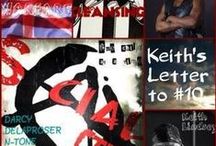Friday 27 May 2011
Why we still have a lot to learn from the Freedom Riders By Angela Tuck
Helen Singleton of Los Angles, left and Ellen Zigkind of Boston, center and Donna Garde of New York City, compare notes about their stays in the cells along with other riders who were jailed in at the Mississippi State Penitentiary 50 years ago in Parchman, Miss. Wednesday, May 25, 2011. (AP Photo/Miss. Freedom 50th Anniversary Reunion, Greg Campbell)
I've seen the grainy photographs of Emmett Till's disfigured body. The accounts of the 14-year-old child's lynching in Money, Mississippi sicken me to this day.
I know well the story of Medgar Evers' assassination and the decades-long crusade of his widow to bring his killer to justice.
I am passing the final resting place of Dr. Martin Luther King Jr. and Coretta Scott King at The King Center in Atlanta, preparing to a board a bus bound for Jackson, Miss. There are 48 of us, ages 6 to 70, taking this journey to places where history was made -- often at great personal sacrifice.
What must it have been like to board segregated buses 50 years ago, when indignities and insults were the norm?
Click here to view a Grio slideshow remembering Freedom Riders
Dr. Bernard LaFayette Jr. holds these tours annually. The former Freedom Rider who helped lead the Nashville Student Movement in 1960 and King's Poor Peoples Campaign in 1968, says the trips serve to educate people about the techniques and strategies of nonviolent direct action that came to define the Civil Rights Movement.
The protests in Nashville may not have happened had the Rev. J.M. Lawson Jr., a Methodist minister from Ohio urged by King to move to the south, gone to Atlanta's Emory University instead of Vanderbilt. Lawson chose Vanderbilt because Emory's theology school didn't admit blacks, LaFayette recalled.
Lawson's intense training of Nashville's college students led thousands in the city to join the movement targeting segregated lunch counters and other public facilities.
Students arrived meticulously dressed and prepared for the worst. They timed their protests so they would land in jail by 5 p.m. -- in time for the evening meal.
In Montgomery, just down the street from King's home, LaFayette pointed to a large two-story home where Freedom Riders tried unsuccessfully to persuade King to join their movement protesting segregation in interstate travel in 1961.
Some students believed King was a coward when he declined to join them, but there was no question about King's courage, said LaFayette, reminding us that King's home had been bombed shortly after he took the helm of the Montgomery Bus Boycott. King didn't join the rides because he was on probation for a conviction in Georgia on a driving charge. Had he been arrested, he would have had to serve out his jail sentence.
Subscribe to:
Post Comments (Atom)


No comments:
Post a Comment